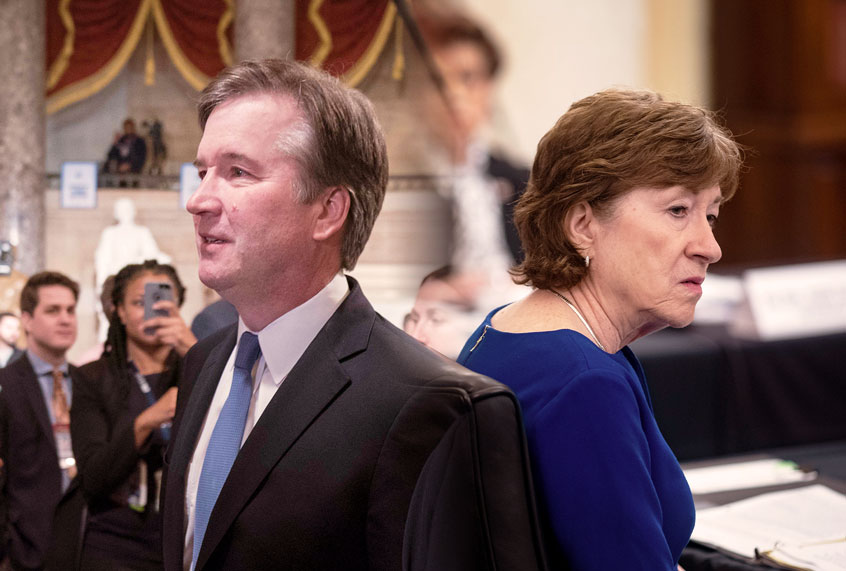Embattled Sen. Susan Collins, R-Maine, said in a statement Monday that she agreed with the Supreme Court decision striking down Louisiana’s draconian abortion law, adding that while conservative Justice Brett Kavanaugh sided with the minority, his opinion “gave no indication” that he would overturn Roe v. Wade, the 1973 decision that legalized abortion nationwide.
“Some have tried to suggest that this opinion is an indication of now certain justices would vote on the question of whether abortion remains legal. That is reading too much into this specific decision,” said Collins, almost the last nominally pro-choice Republican in national politics.
“As Justice Gorsuch noted, ‘In truth Roe v. Wade is not even at issue here,'” Collins continued. “And while Justice Kavanaugh called for additional fact finding in the case, he gave no indication in his dissenting opinion that he supports overturning Roe.”
Collins, who has won four consecutive Senate races in Maine, finds herself trailing Democratic challenger Sara Gideon in a campaign haunted by her 2018 vote to confirm Kavanaugh, despite credible allegations of sexual assault and a common understanding that he would vote to overturn Roe v. Wade — and indeed was chosen specifically for that purpose.
Ahead of that vote, Collins famously claimed to believe that Kavanaugh would respect the precedent of Roe, and would not erode women’s reproductive rights.
At the time, Collins argued that she “could not vote for a judge who had demonstrated hostility to Roe v Wade because it would indicate a lack of respect for precedent. He views precedent … as rooted in our Constitution.”
The decision appears to have cost her politically, particularly among women, which Gideon was quick to exploit Monday.
“Do you still think Brett Kavanaugh believes Roe v. Wade is settled law, @SenSusanCollins?” Gideon tweeted Monday.
Do you still think Brett Kavanaugh believes Roe v. Wade is settled law, @SenSusanCollins?#MESen #mepolitics pic.twitter.com/OiuWeVTWkd
— Sara Gideon (@SaraGideon) June 29, 2020
Indeed, the infamous mugwump was predictably dragged on social media after news of the decision broke.
I don’t know, @SenatorCollins, if only there was some kind of warning or sworn testimony that could have possibly hinted Kavanaugh doesn’t champion female bodily autonomy. https://t.co/C5PIW909Yi
— Bess Kalb (@bessbell) June 29, 2020
It appears Susan Collins’ predictions were not carried to term
— Jess Dweck (@TheDweck) June 29, 2020
“Everyone who voted wrong, we’re coming for you,” tweeted Ilyse Hogue, president of NARAL Pro-Choice America, naming Collins among four other Republican senators seen as particularly vulnerable: Cory Gardner of Colorado, Joni Ernst of Iowa, Thom Tillis of North Carolina and Lindsey Graham of South Carolina.
In a matter of hours, NARAL had released a compilation of Collins’ claims that Kavanaugh would uphold the precedent established in Roe.
But it was Kavanaugh who broke with precedent in the Louisiana decision, deviating from the court’s 2016 ruling in Whole Woman’s Health v. Hellerstedt.
The 5-4 ruling Monday rejected a new Louisiana law that required abortion providers to have admitting privileges at nearby hospitals. Two Louisiana doctors and a medical clinic had sued to overturn the law, arguing that only one doctor at one clinic would be able to provide abortion services for nearly 10,000 women per year.
“This is a victory for the people of Louisiana and the rule of law, but this case never should have gotten this far,” said Nancy Northup, president of the Center for Reproductive Rights, which represented the medical clinic in the case.
“We won an identical case four years ago in Whole Woman’s Health v. Hellerstedt, and the fact that we had to fight so hard again goes to show that nothing should be taken for granted when it comes to protecting abortion rights,” she said.
Collins has found herself increasingly targeted by attacks from outside groups who sense that she is vulnerabl, such as the Lincoln Project, a PAC of never-Trump Republican operatives who have run ads in recent months excoriating Collins for betraying her electorate.
Republican groups seem to smell the fear, as well. A dark money group affiliated with Senate Majority Leader Mitch McConnell, R-Ky., and election strategist Karl Rove has spent at least $1 million on defending Collins’ seat since January. That month, Collins toppled McConnell in public-opinion polling as the most unpopular member of the U.S. Senate.

